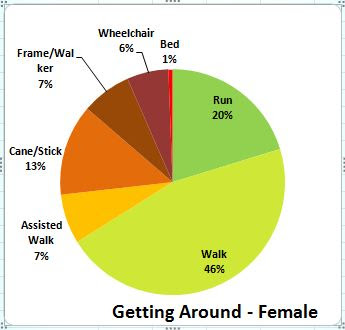When I started this survey and analysing the results I never thought I would get this many and this far (in a way I am sorry it has taken so long for me to publish them)!
This section starts with the treatment periods. Below is a comparison graph, between the numbers of treatments being provided for GBS (red) and CIDP (green):
This is a very interesting comparison of how frequent people are being treated. The vast majority of GBS sufferers are either having daily treatment or none, yet for CIDP it is either daily or monthly (which is what you would expect, given the differences between the diseases?). I am presuming that daily are pills (e.g. Steroids) and monthly is Plasma/IVIG.
The Details: 40% of people with GBS have no treatments, yet less than 4% with CIDP do. 41% of GBS have daily treatments and 23% of CIDP. At the other end of the scale; around 10% of those with CIDP have treatments every 2 or 3 weeks, with 33% having treatments every month (or 4 weeks), whereas only 7% of GBS have monthly treatments. The average treatment period for those with GBS is every 4.6 days, yet with CIDP it is 18.6 days.
Below are the graphs on how mobile people are (split into Overall, GBS, CIDP, Male & Female):
There are some interesting differences between the groups:
- Very few are completely bed bound and none of those with CIDP are.
- 27% of those with GBS and now run and only 15% with CIDP (personally if I had to "run for my life" I'd be dead! - it is not an option)
- 68% of those with GBS can run or walk compared with 59% of CIDP
- 23% of those with CIDP use a cane/stick and only 15% of those with GBS (this must be linked to the previous point from a simple numbers percentage)
- The only point from the male and female statistics is that males use canes/sticks much more (24% to 13%)
Next I reviewed the external care required, see the table below:
What really surprises me is that 80% of people said they needed no external care. Now this may be my fault for the way the question was phrased: "Do you need external care - others to look after you?". I meant this to include any one else, e.g. family as well and due to such a high "No" response, I wonder if some answered in this way. Still it is an excellent and significant number who do not need any assistance from others.
At the other end of the scale only 9% need help for everything, which is also encouraging. Looking across all the categories the numbers are remarkably consistent (and because 80& don't need help, very low).
I added a couple of heading from the Other answers, driving and chores, as they seemed to be worthwhile. I do understand that some people may have overlapped answers/categories and those be covered elsewhere, but that is the problem with any survey/questions (whether verbal, written, web or any other), how do you phrase a question to ensure that all respondents understand exactly what is meant and answer in exactly the same way/terms/scale as everyone else.......
You Can't







No comments:
Post a Comment